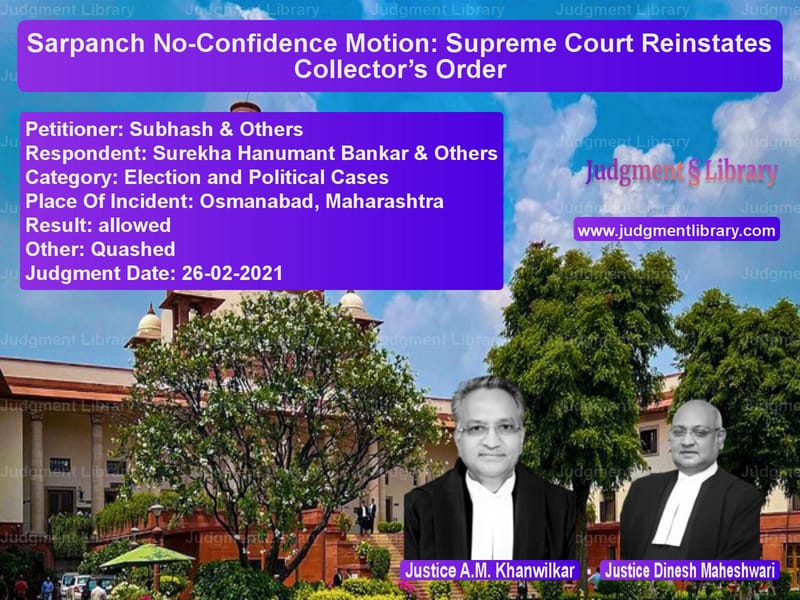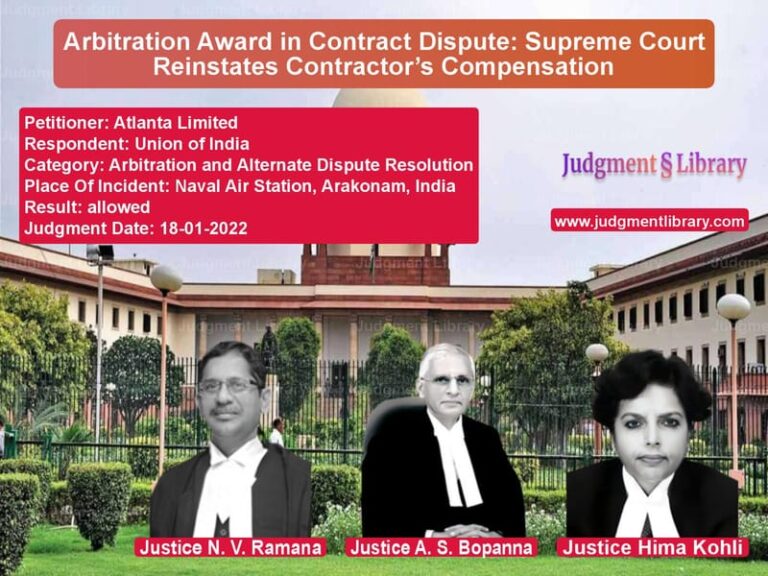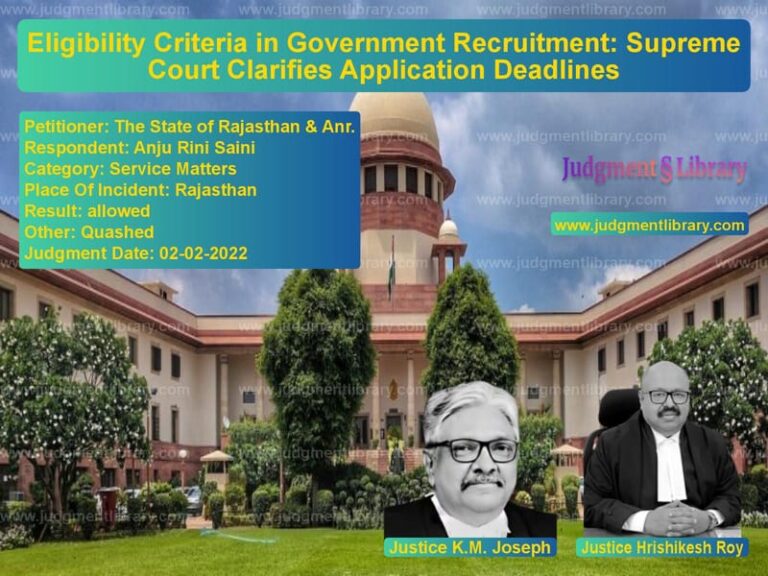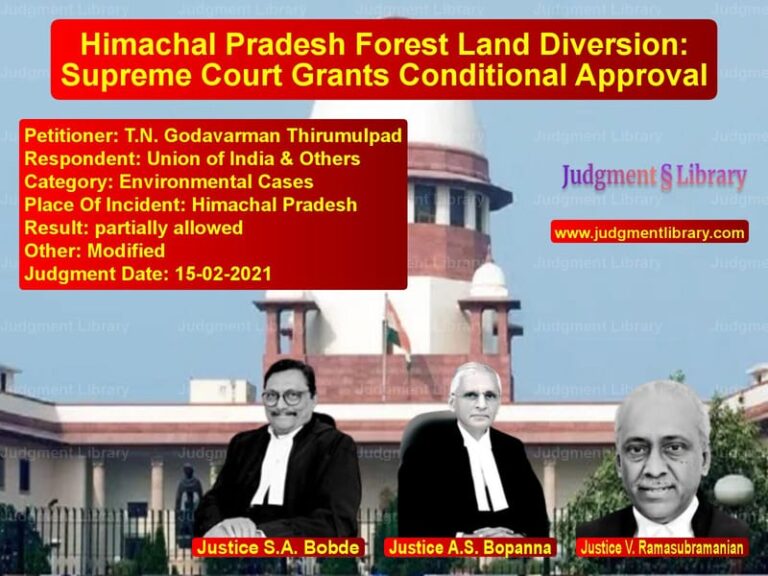Sarpanch No-Confidence Motion: Supreme Court Reinstates Collector’s Order
The Supreme Court of India recently ruled in Subhash & Others vs. Surekha Hanumant Bankar & Others, addressing a dispute over a no-confidence motion against the elected Sarpanch of a village panchayat. The Court set aside the Bombay High Court’s decision, upholding the requirement of ratification of the motion through a Special Gram Sabha.
Background of the Case
The case originated from the Karajkheda Gram Panchayat, Taluka Osmanabad, Maharashtra, where the respondent, Surekha Hanumant Bankar, was elected as the Sarpanch in the general election held on October 17, 2017. However, on October 19, 2020, the Gram Panchayat passed a no-confidence motion against her due to alleged acts of omission and commission.
The matter was escalated to the District Collector, who, on December 31, 2020, ordered a Special Gram Sabha for secret ballot voting to confirm the no-confidence motion. However, the respondent challenged this order in the Bombay High Court, which set aside both the Collector’s order and the no-confidence resolution.
Aggrieved by this decision, the appellants moved the Supreme Court, arguing that the High Court wrongly nullified the democratic process without allowing due procedures to be followed.
Petitioner’s (Subhash & Others) Arguments
The appellants made the following submissions before the Supreme Court:
- The no-confidence motion was passed with the requisite majority as per the Maharashtra Village Panchayats Act.
- The Collector’s order correctly directed that the motion be ratified by a Special Gram Sabha through a secret ballot.
- The High Court erred in setting aside the Collector’s order and the Gram Panchayat’s resolution without considering statutory requirements.
- The respondent (Sarpanch) should not be allowed to continue in office without the democratic process being completed.
Respondent’s (Surekha Hanumant Bankar) Arguments
The respondent raised the following counterarguments:
- The resolution was passed on October 19, 2020, but as per government guidelines issued on October 20, 2020, it should have been placed before a Special Gram Sabha within 10 days.
- Since the Special Gram Sabha was not convened in time, the motion had automatically lapsed.
- The High Court correctly ruled in favor of quashing the resolution and the Collector’s order.
Supreme Court’s Observations
The Supreme Court, comprising Justices A.M. Khanwilkar and Dinesh Maheshwari, analyzed the case and made the following key observations:
- Section 35-1A of the Maharashtra Village Panchayats Act mandates that a no-confidence motion against a directly elected Sarpanch must be ratified by a Special Gram Sabha through a secret ballot.
- “If the motion of no-confidence is carried by a majority of not less than three-fourths of the total number of members… and ratified before the Special Gram Sabha by secret ballot, the Sarpanch shall forthwith stop exercising all powers and performing duties of the office.”
- The High Court wrongly assumed that the no-confidence motion had lapsed merely due to the delay in holding the Special Gram Sabha.
- The law does not contain any provision stating that a motion lapses if the Gram Sabha is not convened within a specific timeframe.
- The delay in conducting the Special Gram Sabha was caused by legal proceedings initiated by the respondent, which prevented the process from moving forward.
- The High Court’s decision deprived the Gram Panchayat members of their statutory right to express their confidence or lack thereof in the Sarpanch.
The Supreme Court observed:
“The respondent cannot be allowed to take advantage of the delay caused by legal proceedings to nullify the democratic process.”
Final Judgment
The Supreme Court set aside the Bombay High Court’s ruling and reinstated the Collector’s order. It directed that:
- A Special Gram Sabha be convened immediately to vote on the no-confidence motion through a secret ballot.
- The District Collector should oversee the process and ensure compliance with statutory requirements.
- Until the Gram Sabha votes on the motion, the Upa-Sarpanch (Deputy Sarpanch) should hold the office of Sarpanch.
- The process should be completed at the earliest to avoid further administrative uncertainty.
Impact of the Judgment
The Supreme Court’s ruling has several important implications:
- Reinforcement of Democratic Processes: The ruling ensures that elected representatives remain accountable to their constituencies through legally prescribed mechanisms.
- Clarification on No-Confidence Motions: The judgment clarifies that such motions do not automatically lapse if delayed due to judicial proceedings.
- Role of Special Gram Sabha: The ruling highlights the necessity of a Special Gram Sabha to confirm the validity of a no-confidence motion.
- Limiting Judicial Overreach: The Court set a precedent that High Courts should not interfere prematurely in democratic processes unless a clear legal violation has occurred.
- Prevention of Abuse of Legal Loopholes: The ruling prevents elected officials from using legal delays to evade accountability.
Conclusion
The Supreme Court’s decision in Subhash & Others vs. Surekha Hanumant Bankar & Others upholds the sanctity of democratic governance at the grassroots level. By ensuring that the no-confidence motion is ratified through a Special Gram Sabha, the Court reinforced the role of public participation in local self-governance.
This ruling serves as an important precedent for future cases involving disputes over no-confidence motions against elected officials. It ensures that statutory processes are followed and prevents undue judicial interference in matters best resolved through democratic means.
Petitioner Name: Subhash & Others.Respondent Name: Surekha Hanumant Bankar & Others.Judgment By: Justice A.M. Khanwilkar, Justice Dinesh Maheshwari.Place Of Incident: Osmanabad, Maharashtra.Judgment Date: 26-02-2021.
Don’t miss out on the full details! Download the complete judgment in PDF format below and gain valuable insights instantly!
Download Judgment: subhash-&-others-vs-surekha-hanumant-ban-supreme-court-of-india-judgment-dated-26-02-2021.pdf
Directly Download Judgment: Directly download this Judgment
See all petitions in Public Interest Litigation
See all petitions in Legislative Powers
See all petitions in Fundamental Rights
See all petitions in Separation of Powers
See all petitions in Judgment by A M Khanwilkar
See all petitions in Judgment by Dinesh Maheshwari
See all petitions in allowed
See all petitions in Quashed
See all petitions in supreme court of India judgments February 2021
See all petitions in 2021 judgments
See all posts in Election and Political Cases Category
See all allowed petitions in Election and Political Cases Category
See all Dismissed petitions in Election and Political Cases Category
See all partially allowed petitions in Election and Political Cases Category







